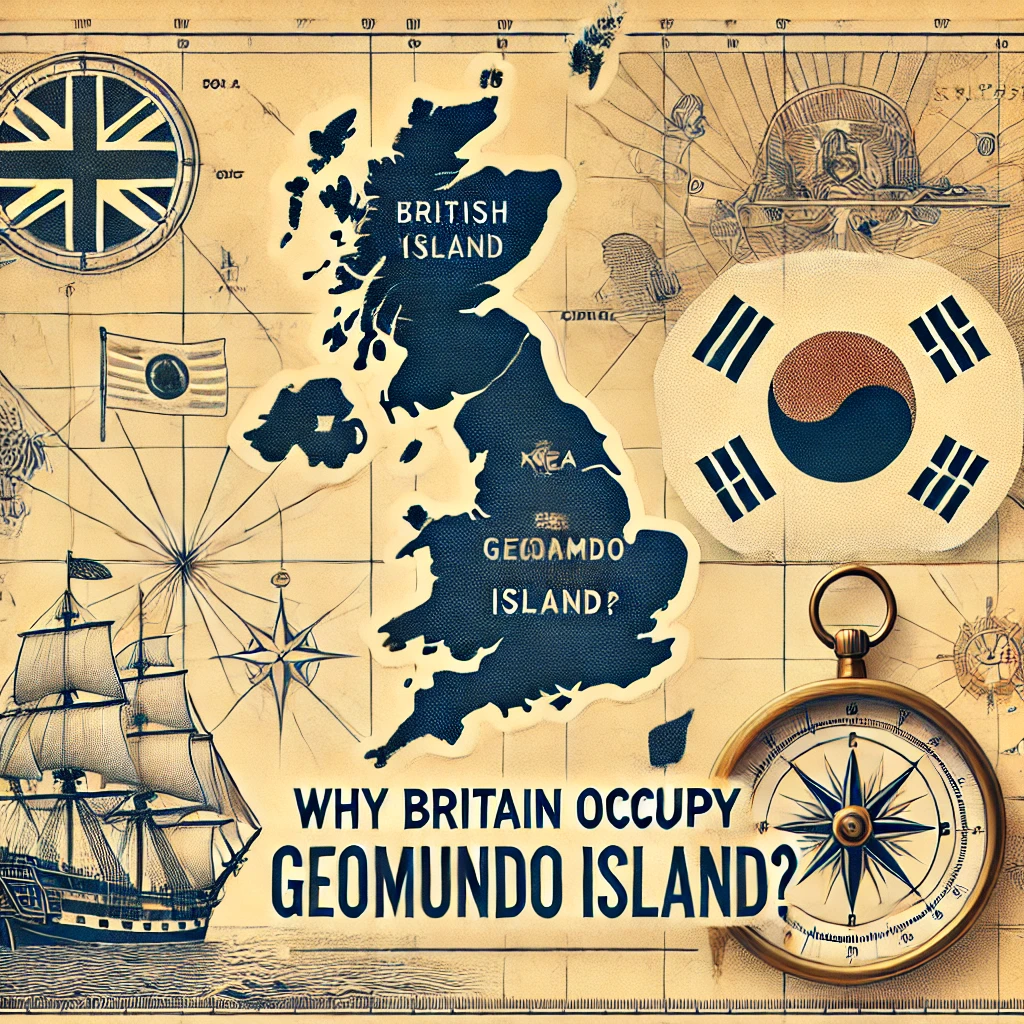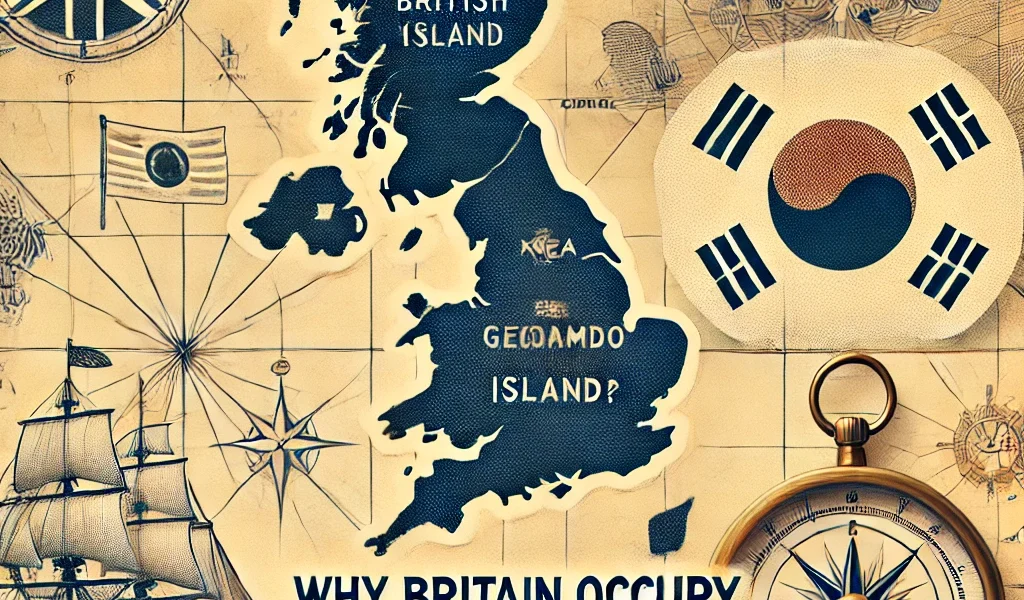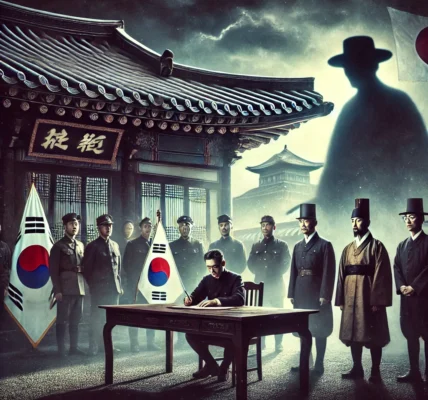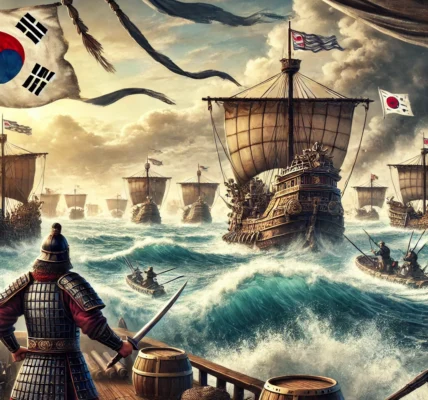Introduction
In 1885, a small and relatively unknown island off the southern coast of Korea became the center of international attention. Geomundo, also known as Port Hamilton, was suddenly occupied by the British Royal Navy. But why did this happen, and what were the geopolitical motives behind Britain’s actions? Let’s delve into the fascinating story of Britain’s occupation of Geomundo Island.

🏴☠️ The Context: The Great Game and Geopolitical Tensions
During the late 19th century, two of the world’s greatest powers, Britain and Russia, were engaged in a fierce geopolitical struggle known as “The Great Game.” This rivalry centered around control and influence over Central Asia, and ultimately, access to warm water ports.
1. Russia’s Expansion and Desire for a Warm-Water Port
- Russia, an expansive empire, lacked direct access to the warm seas. For Russia to access the Pacific Ocean, it needed to establish a route via Korean waters.
- The fear was that Russia could use this route to expand its influence, threatening the British-controlled sea routes to India, a crucial British colony at that time.
2. Britain’s Need to Counter Russia’s Influence
- Britain, seeking to protect its interests and trade routes, was concerned about Russia’s growing naval power and potential access to Korea’s coast.
- To prevent Russian expansion, Britain decided to act preemptively, and Geomundo Island was seen as a strategic point to monitor Russian naval activities.
🏝️ Why Geomundo? The Strategic Importance
So why did Britain choose Geomundo among all the possible locations?
1. Natural Advantages
- Geomundo’s deep harbor and natural defenses made it an ideal location for a naval base. It provided excellent anchorage and shelter for ships, making it a perfect spot to monitor activities in the East China Sea.
- The island’s position allowed control over sea routes to both China and Japan, giving Britain a strategic advantage in the region.
2. Proximity to Russian Interests
- Geomundo was conveniently located near Vladivostok, a key Russian port, allowing the British to keep a close watch on any Russian naval movements.
- This location ensured that Britain could react quickly if Russia made any moves towards Korean waters or attempted to gain influence in East Asia.
⚓ The Occupation: How Britain Took Control of Geomundo
On April 15, 1885, the British fleet arrived at Geomundo, marking the beginning of their occupation.
1. Sudden Arrival
- The British sent several warships and transport vessels to Geomundo, taking both the local Korean population and officials by surprise.
- Without facing any resistance, the British forces quickly landed on the island and established control.
2. Building Fortifications and Infrastructure
- The British set up military installations and infrastructure on Geomundo, including gun emplacements and supply depots, to solidify their presence.
- Despite the occupation, British soldiers maintained relatively peaceful relations with the local residents, even providing some economic benefits to the islanders.
🏴 The Outcome: Why Did Britain Eventually Leave?
The occupation of Geomundo lasted for about two years, but it didn’t result in a permanent British presence on the island.
1. Changing Geopolitical Circumstances
- The tensions between Britain and Russia over Central Asia began to de-escalate, particularly after both powers reached agreements regarding the Afghanistan boundary.
- As the threat of a Russian advance into Korean waters diminished, Britain saw less strategic need to maintain its presence on Geomundo.
2. Diplomatic Pressures
- The Korean government, along with other regional powers like China, expressed concerns about Britain’s occupation, leading to diplomatic discussions.
- Eventually, in 1887, Britain agreed to withdraw from Geomundo, under the condition that no other foreign power would take control of the island.
🌏 The Legacy of Britain’s Occupation of Geomundo
Today, the British occupation of Geomundo is remembered as a brief yet significant moment in Korean history.
1. A Reminder of Colonial Interests
- Britain’s occupation serves as a reminder of how major powers sought to control strategic locations during the age of imperialism.
- It also highlights the importance of Korea’s geopolitical position in East Asia, which continues to influence international relations today.
2. Geomundo’s Ongoing Strategic Value
- While Britain left the island over a century ago, Geomundo remains an important location in maritime studies, history, and geopolitical strategy in East Asia.
Conclusion
The story of Britain’s occupation of Geomundo Island is a fascinating example of how global powers once vied for control and influence in East Asia. While it was a short-lived occupation, it speaks volumes about the larger geopolitical struggles of the 19th century. Today, Geomundo serves as a historical reminder of the complex and often turbulent relationships between East and West.











